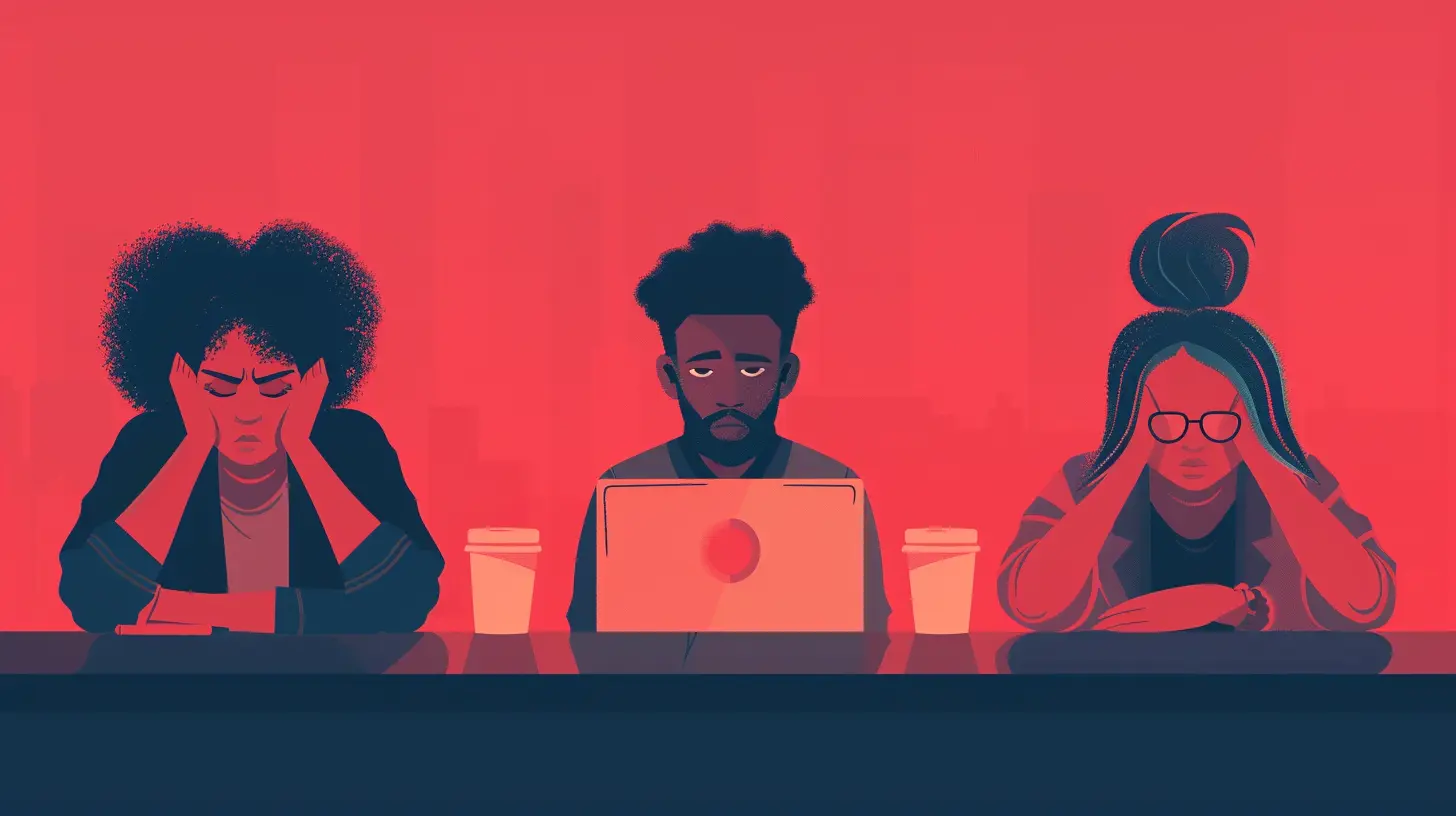The Effects of Microaggressions on Workplace Mental Health
21 August 2025
We often hear about workplace stress, toxic bosses, or heavy workloads as major culprits behind poor mental health at work. But there's something more subtle—more insidious—that slips under the radar and leaves deep emotional wounds: microaggressions.
Yep, those small, often unintentional comments or actions that seem harmless on the surface but carry a sting that lingers. You might hear something like, “Wow, you’re so articulate for someone from [insert cultural background],” or “You don’t act like most women in tech.” Sound familiar? These are examples of microaggressions—and while they may seem like minor slips, their impact is anything but small.
Let’s take a deep (but totally human) dive into how microaggressions influence mental health in the workplace and why it’s time we stop brushing them off like they’re no big deal.
What Are Microaggressions, Anyway?
Before we go any further, let’s make sure we’re on the same page.Microaggressions are subtle, often unintentional, comments or behaviors that express prejudice or discrimination toward a marginalized group. They’re like paper cuts to the psyche—one may not do much damage, but repeated over time? Ouch.
They generally fall into three main categories:
- Microassaults: Blatant, intentional slights (although still considered “micro” because they’re indirect).
- Microinsults: Comments or behaviors that subtly convey rudeness or insensitivity.
- Microinvalidations: Remarks that dismiss or negate someone’s thoughts, feelings, or experiences.
Sound familiar? If you’re from a minority group—racial, gender, sexual orientation, disability status—there’s a good chance you’ve experienced one or more of these.
The Real-World Impact on Mental Health
Let’s get real here: microaggressions, while small in appearance, can feel like emotional landmines. You never know when one’s going to hit, and that unpredictability builds chronic stress.1. Death by a Thousand Cuts
Ever hear the phrase “death by a thousand cuts”? That’s exactly how microaggressions feel when they’re a part of the daily grind.Imagine constantly being second-guessed, subtly dismissed, or stereotyped in ways that make you feel less-than. It’s exhausting. Over time, it chips away at your self-worth and sense of belonging. That buildup becomes mental clutter—stress, anxiety, and even depression.
2. Imposter Syndrome on Steroids
Already feeling like the odd one out at work? Add a few microaggressions, and suddenly you’re questioning everything—your skills, your intelligence, your right to be in the room.Microaggressions can reinforce the feeling that you don’t belong, that you’re a “diversity hire” or not really as capable as your peers. That inner critic? It gets really loud.
3. Emotional Fatigue and Burnout
Navigating this mess takes energy—emotional, mental, even physical. Whether you’re constantly debating whether to speak up or let it slide, the internal back-and-forth is draining.Emotionally exhausted employees are less likely to feel engaged, motivated, or connected to their workplace. That’s a fast track to burnout.
Where Microaggressions Show Up in the Workplace
You might think microaggressions only happen in passing conversations, but they sneak into every corner of work life.Unconscious Bias in Feedback
Ever get vague performance feedback while your peers receive clear, actionable steps? Or worse, notice the tone shift when you're being critiqued versus someone else?Yeah, that can be a microaggression too. The assumption that you’re not capable or that your communication style is “too aggressive” is often coded language rooted in bias.
Tokenism in Team Settings
Being the “token” fill-in-the-blank in a group—whether it’s the only woman, person of color, or LGBTQ+ employee—is isolating. You’re put in the position of spokesperson for an entire group, or worse, your presence is used to tick off a diversity checkbox.Sound familiar? That isolation can do a number on your mental health.
Cultural Appropriation and Stereotypes
When people make jokes or wear culturally significant clothing “for fun,” it’s not just tone-deaf—it’s hurtful. Minimizing or mocking cultural practices fosters a climate where people from those backgrounds feel minimized too.
The Ripple Effects: Why Companies Should Care
It’s not just the individuals who suffer. Microaggressions poison the well for everyone.Reduced Productivity and Engagement
Let's face it—when you’re dealing with emotional stress, your Performance Meter takes a nosedive. Constantly trying to “prove yourself” or mentally prepare for the next offensive comment doesn’t leave much room for creativity or focus.Increased Turnover
Employees who feel unvalued or unsafe won’t stick around—and they shouldn’t have to. High turnover costs companies big time. Trust me, recruiting and training new talent is a lot more expensive than creating a healthy workplace culture.Damaged Reputation
In a world where company reviews live forever online, workplace culture is more visible than ever. Word gets out, and potential employees (especially top talent from underrepresented groups) will think twice before joining a problematic workplace.Let’s Talk About Healing: What Can We Do?
Okay, so microaggressions are real, and they suck. But don’t worry—this isn’t all doom and gloom. There are real steps that both individuals and organizations can take to stop the cycle and start the healing.1. Validate the Experiences
If someone shares that they’ve experienced a microaggression, believe them. This sounds obvious, but it doesn’t always happen.Saying things like “I’m sure they didn’t mean it” or “You’re overreacting” invalidates their experience and adds insult to injury. Instead, try: “That sounds really frustrating. I’m sorry you had to deal with that.”
2. Speak Up—Even When It’s Uncomfortable
If you witness a microaggression, call it out—but do it with kindness. Something like, “Hey, I know you probably didn’t mean it this way, but that comment might come across as insensitive.” It’s not about canceling people—it’s about creating teachable moments.Remember: silence = complicity.
3. Build Safe Spaces for Dialogue
Encourage open conversations about identity, inclusion, and bias. That could mean formal diversity training, informal “lunch and learns,” or employee resource groups.It’s not about being perfect—it’s about being willing to learn and grow.
4. Re-evaluate Company Culture
Managers and HR professionals, this one’s mostly for you. Take a hard look at hiring practices, performance reviews, promotion criteria, and leadership pipelines. Are they fair? Transparent? Inclusive?Your policies should match your promises.
The Role of Mental Health Support
Let’s not forget the professionals. Therapists, counselors, and employee assistance programs (EAPs) play a huge role in helping people process the emotional toll of microaggressions.If you're on the receiving end of these subtle attacks, talking to a therapist who understands racial trauma, minority stress, or LGBTQ+ issues can be a total game changer. Don’t underestimate the power of having a safe, nonjudgmental space to unpack it all.
A Final Word: It’s the Little Things That Matter Most
Sometimes the things left unsaid speak the loudest, don’t they?Microaggressions thrive in silence, in normalization, and in the gray areas where “I was just joking” becomes a shield against accountability. But we can shift that narrative—one conversation, one courageous step at a time.
If you’ve ever been on the receiving end of a microaggression at work, please know this: you’re not imagining it, you’re not too sensitive, and you absolutely deserve to feel safe and respected at work.
And if you’ve found yourself on the giving end—intentionally or not—this isn’t about guilt. It’s about growth. Whatever your role, you’ve got the power to make a difference.
After all, mental health in the workplace isn't just about yoga breaks and stress balls. It’s about fostering a culture where everyone feels seen, heard, and valued. Let’s aim for that, together.
all images in this post were generated using AI tools
Category:
Workplace PsychologyAuthor:

Ember Forbes
Discussion
rate this article
1 comments
Cypher Brooks
Empower yourself and others by fostering awareness; small actions can create a healthier, more inclusive workplace for everyone.
September 22, 2025 at 3:31 PM

Ember Forbes
Thank you for your insightful comment! Promoting awareness and taking small actions are crucial steps in creating a supportive and inclusive workplace. Together, we can combat microaggressions and enhance mental health for all.


